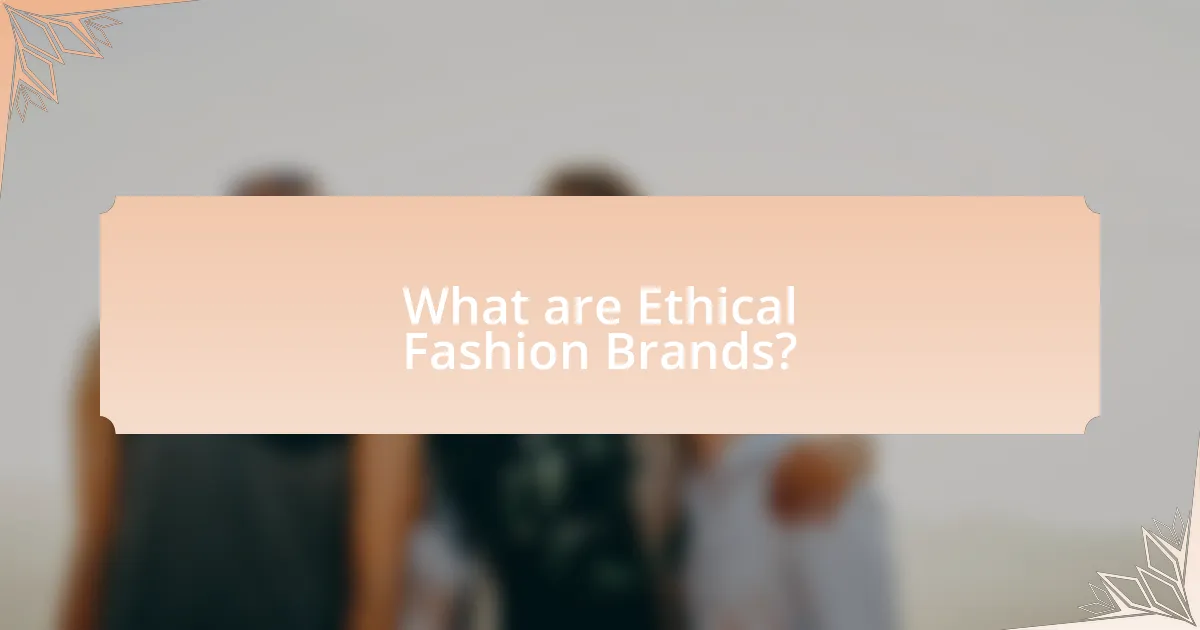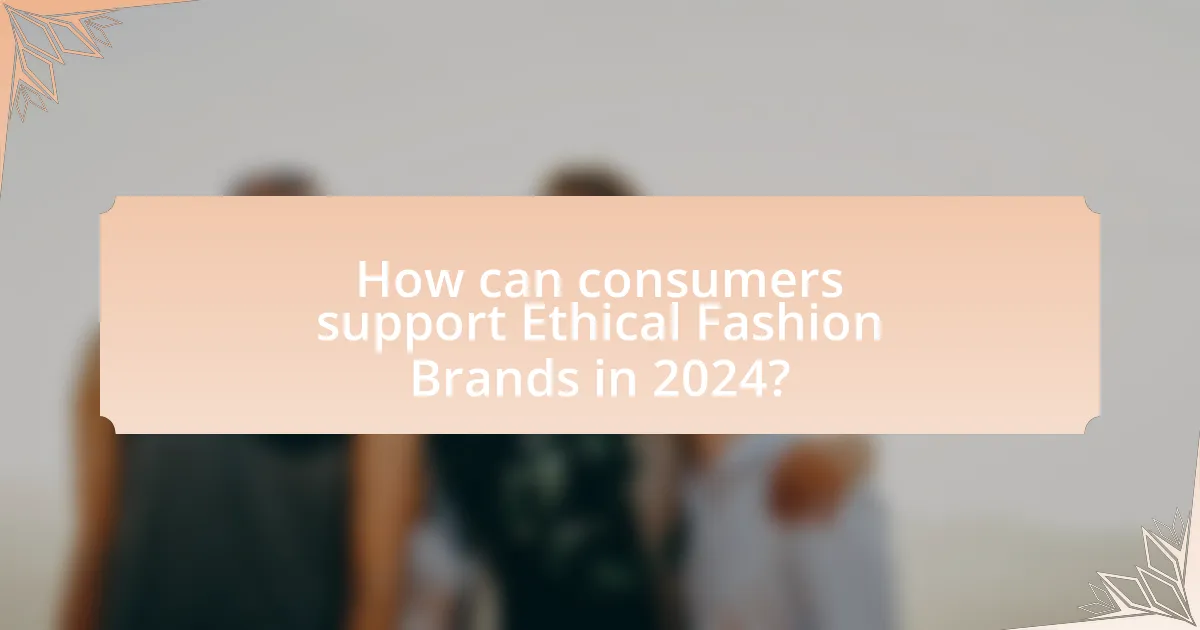Ethical fashion brands are companies that emphasize sustainable practices, fair labor conditions, and environmentally friendly materials in their production processes. This article explores the differences between ethical and traditional fashion brands, highlighting principles such as sustainability, transparency, and animal welfare that define ethical fashion. It also examines the growing momentum of the ethical fashion movement driven by consumer demand for responsible practices, identifies leading ethical brands in 2024, and discusses how consumers can support these brands through informed purchasing decisions. Additionally, the article outlines practical tips for embracing ethical fashion and the long-term benefits of supporting brands committed to ethical standards.

What are Ethical Fashion Brands?
Ethical fashion brands are companies that prioritize sustainable practices, fair labor conditions, and environmentally friendly materials in their production processes. These brands often focus on transparency in their supply chains, ensuring that workers are paid fairly and work in safe conditions. For example, brands like Patagonia and Everlane are known for their commitment to ethical sourcing and environmental responsibility, often using organic materials and promoting fair trade practices. This approach not only addresses social and environmental issues but also appeals to consumers increasingly concerned about the impact of their purchases.
How do Ethical Fashion Brands differ from traditional fashion brands?
Ethical fashion brands differ from traditional fashion brands primarily in their commitment to sustainability and social responsibility. Ethical fashion brands prioritize environmentally friendly materials, fair labor practices, and transparency in their supply chains, whereas traditional fashion brands often focus on maximizing profit, which can lead to exploitative labor conditions and environmental harm. For instance, a report by the Ethical Fashion Forum highlights that ethical brands typically use organic or recycled materials, reducing their carbon footprint, while traditional brands may rely on cheaper, non-sustainable materials. Additionally, ethical brands often engage in fair trade practices, ensuring that workers receive fair wages and safe working conditions, contrasting with the labor practices of many traditional brands that may prioritize cost-cutting over ethical considerations.
What principles define ethical fashion?
Ethical fashion is defined by principles such as sustainability, fair labor practices, transparency, and animal welfare. Sustainability emphasizes the use of eco-friendly materials and processes that minimize environmental impact, while fair labor practices ensure that workers receive fair wages and safe working conditions. Transparency involves clear communication about sourcing and production methods, allowing consumers to make informed choices. Animal welfare principles advocate for humane treatment of animals in the fashion supply chain. These principles collectively promote a more responsible and conscious approach to fashion, aligning with growing consumer demand for ethical practices in the industry.
How do ethical practices impact the fashion supply chain?
Ethical practices significantly enhance the fashion supply chain by promoting sustainability, transparency, and fair labor conditions. These practices lead to reduced environmental impact through the use of sustainable materials and eco-friendly production methods, which can lower carbon emissions and waste. For instance, brands that adopt ethical sourcing often report improved resource efficiency, as seen in the 2021 report by the Global Fashion Agenda, which highlighted that sustainable practices could reduce the fashion industry’s greenhouse gas emissions by 30% by 2030. Furthermore, ethical labor practices ensure fair wages and safe working conditions, which can improve worker morale and productivity, ultimately benefiting the supply chain’s efficiency. This alignment with ethical standards not only enhances brand reputation but also attracts a growing consumer base that prioritizes responsible consumption, as evidenced by a 2022 survey from McKinsey & Company indicating that 67% of consumers consider sustainability when making fashion purchases.
Why is the ethical fashion movement gaining momentum?
The ethical fashion movement is gaining momentum due to increasing consumer awareness and demand for sustainable practices in the fashion industry. This shift is driven by a growing recognition of the environmental and social impacts of fast fashion, with studies indicating that 66% of global consumers are willing to pay more for sustainable brands. Additionally, transparency in supply chains and the rise of social media have empowered consumers to make informed choices, further propelling the movement.
What consumer trends are driving the demand for ethical fashion?
The demand for ethical fashion is primarily driven by increasing consumer awareness regarding sustainability and social responsibility. Consumers are increasingly prioritizing brands that demonstrate transparency in their supply chains and ethical labor practices. According to a 2021 survey by McKinsey & Company, 67% of consumers consider sustainability when making a purchase, indicating a significant shift towards eco-conscious buying behavior. Additionally, the rise of social media has amplified the visibility of ethical brands, allowing consumers to engage with and support companies that align with their values. This trend is further supported by the growing millennial and Gen Z demographics, who are more likely to advocate for ethical consumption, as evidenced by a 2020 report from Deloitte, which found that 83% of millennials believe companies should actively address social issues.
How do social and environmental issues influence ethical fashion choices?
Social and environmental issues significantly influence ethical fashion choices by driving consumer demand for sustainable and socially responsible practices. As awareness of climate change and labor exploitation grows, consumers increasingly prefer brands that prioritize eco-friendly materials, fair labor practices, and transparency in their supply chains. For instance, a 2021 survey by McKinsey & Company found that 67% of consumers consider sustainability when making fashion purchases, indicating a clear shift towards ethical considerations in buying behavior. This trend compels fashion brands to adopt ethical practices to remain competitive and meet consumer expectations.

Which Ethical Fashion Brands are Leading the Way in 2024?
In 2024, brands such as Patagonia, Reformation, and Eileen Fisher are leading the way in ethical fashion. Patagonia is renowned for its commitment to environmental sustainability and fair labor practices, having pledged 1% of sales to environmental causes since 1985. Reformation focuses on sustainable materials and transparent supply chains, with a goal to become climate positive by 2025. Eileen Fisher emphasizes organic and recycled fibers, alongside a robust take-back program for its garments, promoting circular fashion. These brands exemplify the shift towards responsible production and consumption in the fashion industry.
What are some notable ethical fashion brands to watch in 2024?
Notable ethical fashion brands to watch in 2024 include Reformation, known for its sustainable practices and transparency in sourcing materials, and Patagonia, which emphasizes environmental activism and responsible manufacturing. Another brand, Eileen Fisher, focuses on circular fashion and fair labor practices, while Allbirds is recognized for its eco-friendly footwear made from natural materials. These brands exemplify commitment to ethical standards, with Reformation reporting a 50% reduction in carbon emissions per product since 2015, and Patagonia donating over $100 million to environmental causes since its inception.
What unique practices do these brands implement?
Ethical fashion brands implement unique practices such as sustainable sourcing, transparent supply chains, and fair labor conditions. For instance, brands like Patagonia utilize recycled materials and promote environmental activism, while Everlane emphasizes radical transparency by disclosing production costs and factory details. These practices not only reduce environmental impact but also foster consumer trust and loyalty, as evidenced by Patagonia’s commitment to donating 1% of sales to environmental causes, which has garnered a dedicated customer base.
How do these brands engage with their communities?
Ethical fashion brands engage with their communities through initiatives such as sustainable practices, local sourcing, and social responsibility programs. For instance, brands often host workshops and events that educate consumers about sustainable fashion, fostering a sense of community involvement. Additionally, many brands collaborate with local artisans and organizations, which not only supports local economies but also strengthens community ties. Research indicates that 70% of consumers prefer brands that demonstrate social responsibility, highlighting the effectiveness of these engagement strategies in building brand loyalty and community support.
What innovations are these brands introducing?
Ethical fashion brands are introducing innovations such as sustainable materials, circular fashion practices, and transparent supply chains. For instance, brands like Stella McCartney are utilizing bio-based fabrics and recycled materials to reduce environmental impact. Additionally, companies like Reformation are implementing circular systems that allow customers to return used garments for recycling, thereby minimizing waste. Furthermore, brands are enhancing transparency by providing detailed information about their sourcing and manufacturing processes, which builds consumer trust and promotes ethical consumption.
How are technology and sustainability being integrated into their practices?
Technology and sustainability are being integrated into ethical fashion brands through innovative practices such as the use of eco-friendly materials, digital supply chain management, and sustainable production techniques. For instance, brands are adopting biodegradable fabrics and recycled materials to reduce environmental impact, while technologies like blockchain enhance transparency in sourcing and production processes. According to a 2022 report by McKinsey & Company, 67% of fashion executives believe that technology will play a crucial role in achieving sustainability goals, highlighting the industry’s shift towards more responsible practices.
What role does transparency play in their business models?
Transparency is crucial in the business models of ethical fashion brands as it fosters trust and accountability with consumers. By openly sharing information about sourcing, production processes, and labor practices, these brands differentiate themselves in a competitive market. For instance, brands like Everlane and Patagonia provide detailed insights into their supply chains, which not only enhances consumer confidence but also encourages responsible purchasing decisions. Research indicates that 73% of consumers are willing to pay more for sustainable products, highlighting the importance of transparency in driving sales and brand loyalty.

How can consumers support Ethical Fashion Brands in 2024?
Consumers can support Ethical Fashion Brands in 2024 by prioritizing purchases from companies that demonstrate transparency in their supply chains and sustainable practices. By choosing brands that provide clear information about their sourcing, labor conditions, and environmental impact, consumers can ensure their spending aligns with ethical standards. Research indicates that 66% of global consumers are willing to pay more for sustainable brands, highlighting the demand for ethical practices in fashion. Additionally, engaging with brands on social media, advocating for ethical practices, and participating in community events can further amplify support for these brands.
What are the best practices for choosing ethical fashion brands?
To choose ethical fashion brands, prioritize transparency, sustainability, and fair labor practices. Ethical brands openly share their supply chain information, demonstrating accountability in sourcing materials and labor. Look for certifications such as Fair Trade, GOTS (Global Organic Textile Standard), or B Corp, which validate their commitment to ethical practices. Research the brand’s environmental impact, including the use of sustainable materials and eco-friendly production methods. Additionally, consider brands that actively support fair wages and safe working conditions for their workers, as evidenced by their adherence to labor rights standards.
How can consumers identify truly ethical brands?
Consumers can identify truly ethical brands by examining their transparency, sourcing practices, and certifications. Ethical brands often provide detailed information about their supply chains, including labor conditions and environmental impact. For instance, brands certified by organizations like Fair Trade or the Global Organic Textile Standard (GOTS) adhere to strict ethical guidelines. Additionally, consumers can look for brands that engage in sustainable practices, such as using recycled materials or reducing carbon footprints, which are often highlighted in their marketing materials. Research indicates that 66% of consumers are willing to pay more for sustainable brands, reinforcing the demand for ethical practices in the fashion industry.
What resources are available for consumers to learn more about ethical fashion?
Consumers can learn more about ethical fashion through various resources, including websites, documentaries, books, and social media platforms. Websites like Good On You provide ratings and information on brands’ ethical practices, while documentaries such as “The True Cost” expose the impacts of fast fashion. Books like “Fashionopolis” by Dana Thomas delve into sustainable fashion practices. Additionally, social media platforms, particularly Instagram, feature influencers and organizations dedicated to promoting ethical fashion, offering insights and recommendations. These resources collectively enhance consumer awareness and understanding of ethical fashion practices.
What impact does consumer support have on the ethical fashion industry?
Consumer support significantly drives the ethical fashion industry by increasing demand for sustainable and ethically produced clothing. This demand encourages brands to adopt more responsible practices, such as using eco-friendly materials and ensuring fair labor conditions. According to a 2021 report by McKinsey & Company, 67% of consumers consider sustainability when making a purchase, indicating a strong preference for ethical brands. As consumer awareness grows, companies are compelled to align their practices with ethical standards to remain competitive, ultimately leading to a more sustainable fashion ecosystem.
How can consumer choices influence brand practices and industry standards?
Consumer choices significantly influence brand practices and industry standards by driving demand for ethical and sustainable products. As consumers increasingly prioritize sustainability, brands are compelled to adopt eco-friendly materials and transparent supply chains to meet these expectations. For instance, a 2021 survey by McKinsey & Company found that 67% of consumers consider sustainability when making a purchase, prompting brands to implement practices that align with these values. Consequently, this shift not only alters individual brand strategies but also sets new benchmarks for industry standards, encouraging widespread adoption of ethical practices across the fashion sector.
What are the long-term benefits of supporting ethical fashion brands?
Supporting ethical fashion brands leads to long-term benefits such as promoting sustainable practices, enhancing social equity, and fostering consumer awareness. By prioritizing sustainable materials and fair labor practices, ethical fashion brands contribute to environmental conservation and reduce waste, which is crucial as the fashion industry is responsible for 10% of global carbon emissions. Additionally, these brands often invest in local communities, ensuring fair wages and safe working conditions, which can improve the quality of life for workers. Research from the Global Fashion Agenda indicates that sustainable practices can lead to a 30% reduction in resource consumption by 2030, highlighting the potential for significant positive impact. Furthermore, consumer awareness and demand for ethical products are increasing, with a 2021 survey by McKinsey showing that 67% of consumers consider sustainability when making a purchase, indicating a shift towards long-term support for ethical brands.
What practical tips can consumers follow to embrace ethical fashion?
Consumers can embrace ethical fashion by prioritizing brands that are transparent about their supply chains and labor practices. Research indicates that 66% of consumers are willing to pay more for sustainable brands, highlighting the demand for ethical practices in the fashion industry. Additionally, consumers should opt for second-hand clothing, as purchasing pre-owned items reduces waste and supports a circular economy. Supporting local artisans and small businesses also fosters ethical production methods, as these entities often prioritize fair labor practices. Lastly, consumers can educate themselves about the materials used in clothing, choosing organic or recycled fabrics that minimize environmental impact.